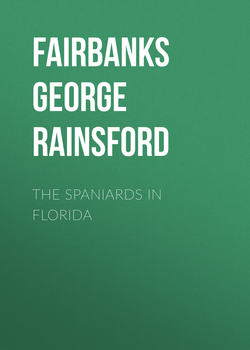Читать книгу The Spaniards in Florida - Fairbanks George Rainsford - Страница 3
CHAPTER I.
INTRODUCTORY
ОглавлениеThe Saint Augustine of the present and the St. Augustine of the past, are in striking contrast.
We see, to-day, a town less in population than hundreds of places of but few months' existence, dilapidated in its appearance, with the stillness of desolation hanging over it, its waters undisturbed except by the passing canoe of the fisherman, its streets unenlivened by busy traffic, and at mid-day it might be supposed to have sunk under the enchanter's wand into an almost eternal sleep.
With no participation in the active schemes of life, and no hopes for the future; with no emulation, and no feverish visions of future greatness; with no corner lots on sale or in demand; with no stocks, save those devoted to disturbers of the public peace; with no excitements and no events; a quiet, undisturbed, dreamy vision of still life surrounds its walls, and creates a sensation of entire repose, pleasant or otherwise, as it falls upon the heart of the weary wanderer sick of life's busy bustle, or upon the restless mind of him who looks to nothing as life except perpetual, unceasing action – the one rejoicing in its rest, the other chafing under its monotony. And yet, about the old city there clings a host of historic associations, that throw around it a charm which few can fail to feel.
Its life is in its past; and when we recall the fact that it was the first permanent settlement of the white man, by more than forty years, in this confederacy; that here for the first time, isolated within the shadows of the primeval forest, the civilization of the Old World made its abiding place, where all was new, and wild, and strange; that this now so insignificant place was the key of an empire; that upon its fate rested the destiny of a nation; that its occupation or retention decided the fate of a people; that it was itself a vice provincial court, boasted of its adelantados, men of the first mark and note, of its Royal Exchequer, its public functionaries, its brave men at arms; that its proud name, conferred by its monarch, "Le siempre fiel Ciudad de San Augustin," – The ever faithful City of St. Augustine – stood out upon the face of history; that here the cross was first planted; that from the Papal throne itself rescripts were addressed to its governors; that the first great efforts at Christianizing the fierce tribes of America proceeded from this spot; that the martyr's blood was first here shed; that within these quiet walls the din of arms, the noise of battle, and the fierce cry of assaulting columns, have been heard; – Who will not then feel that we stand on historic ground, and that an interest attaches to the annals of this ancient city far more than is possessed by mere brick and mortar, rapid growth, or unwonted prosperity? Moss-grown and shattered, it appeals to our instinctive feelings of reverence for antiquity; and we feel desirous to know the history of its earlier days.
